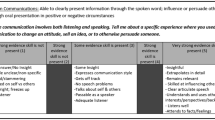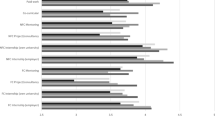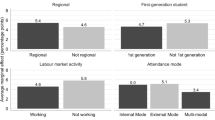Abstract
Objective
The authors aim to determine whether admission interviews predict performance in residency.
Methods
The authors determined whether interview and other admission data were correlated with performance during postgraduate years 2–4 and with remaining in the residency in 544 residents enrolled in a single psychiatry residency program between 1963 and 2004.
Results
Considered together, admissions data predicted 13% of the variance in performance ratings in postgraduate year 2 (PGY-2) and 5% in PGY-4. Interview scores were moderately correlated with performance ratings in PGY-2, modestly correlated with performance in PGY-3, and not correlated with performance ratings in PGY-4. Letters of reference were moderately correlated with performance ratings in PGY-2 and modestly correlated with performance in PGY-3 and PGY-4. In PGY-2, interview scores differentiated between the top quartile of performance and the other three quartiles, while letters of reference differentiated performance in the top and bottom quartiles from the middle quartiles. Numerical differences among groups were not great enough to be practically useful, and no variables predicted which residents would leave the program before completing it.
Conclusion
As they are currently conducted, application interviews do not have sufficient power to predict performance during residency. Letters of reference may be useful to the extent that they reflect personal experience with the applicant, but differences in ratings of these letters are not great enough to base admission decisions on them. As it is currently performed, the interview process may be more useful as a means of interesting applicants in the program than of evaluating their potential for success in the residency.
Similar content being viewed by others
References
Altmaier EM, Smith Wl, O’Halloran CM, et al: The predictive utility of behavior-based interviewing compared with traditional interviewing in the selection of radiology residents. Invest Radiol 1992; 27: 385–389
Balentine J, Gaeta T, Spevack T: Evaluating applicants to emergency medicine residency programs. J Emerg Med 1999; 17: 131–134
Wood PS, Smith Wl, Altmaier EM, et al: A prospective study of cognitive and noncognitive selection criteria as predictors of resident performance. Invest Radiol 1990; 25: 855–859
McDonald JS: Performance of residents in anesthesiology as related to measures of personality and interests. Psychol Rep 1991; 68: 979–994
Smilen SW, Funai EF, Bianco AT: Residency selection: should interviewers be given applicants’ board scores? Am J Obstet Gynecol 2001; 184: 508–513
Takayama H, Grinsell R, Brock D, et al: Is it appropriate to use core clerkship grades in the selection of residents? Curr Surgery 2006; 63: 391–396
McDonald JS, Lingam RP, Gupta B, et al: Psychologic testing as an aid to selection of residents in anesthesiology. Anesthesia & Analgesia 1994; 78: 542–547
Hojat M, Borenstein B, Veloski JJ: Cognitive and noncognitive factors in predicting the clinical performance of medical school graduates. J Med Educ 1988; 63: 323–325
Oggins J, Inglehart M, Brown DR, et al: Gender differences in the prediction of medical students’ clinical performance. JAMWA 1988; 43: 171–175
Arvey RD, Campion JE: The employment interview: summary and review of recent literature. Personnel Psychol 1982; 35: 281–322
Levin RA, Zickar MJ: Investigating self-presentation, lies and bullshit: understanding faking and its effects on hiring decisions using theory, field research and simulation, in The Psychology of Work: Theoretically Based Empirical Research. Edited by Drasgow F, Brett J. Mahwah, NJ, Erlbaum, 2002, pp 253–276
Olawaiye A, Yeh J, Withiam-Leitch M: Resident selection process and prediction of clinical performance in an obstetrics and gynecology program. Teach Learn Med 2006; 18: 310–315
Borowitz SM, Saulsbury FT, Wilson WG: Information collected during the residency match process does not predict clinical performance. Arch Pediatr Adolesc Med 2000; 15: 256–260
Rolfe IE, Pearson S, Powis DA, et al: Time for a review of admission to medical school? Lancet 1995; 346: 1329–1333
Komives E, Weiss ST, Rosa RM: The applicant interview as a predictor of resident performance. J Med Educ 1984; 59: 425–426
Papp KK, Polk HC, Richardson JD: The relationship between criteria used to select residents and performance during residency. Am J Surgery 1997; 173: 326–329
Laskin DM, Lesny RJ, Best AM: The residents’ viewpoint of the matching process, factors influencing their program selection, and satisfaction with the results. J Oral Maxillofac Surg 2003; 61: 228–233
Benjamin S, Robbins LI, Kung S: Online resources for assessment and evaluation. Acad Psychiatry 2006; 30: 498–504
Reilley RR, Chao GT: Validity and fairness of some alternative employee selection procedures. Personnel Psychol 1982; 35: 1–62
Wright SM, Ziegelstein RC: Writing more informative letters of reference. Gen Intern Med 2004; 19: 588–593
Ericsson KA, Charness N: Expert performance: its structure and acquisition. Am Psychol 1994; 49: 725–747
Ericsson KA, Simon HA: Protocol Analysis: Verbal Reports as Data (revised). Cambridge, Mass, Bradford Books/MIT Press, 1993
Author information
Authors and Affiliations
Corresponding author
Rights and permissions
About this article
Cite this article
Dubovsky, S.L., Gendel, M.H., Dubovsky, A.N. et al. Can Admissions Interviews Predict Performance in Residency?. Acad Psychiatry 32, 498–503 (2008). https://doi.org/10.1176/appi.ap.32.6.498
Received:
Revised:
Accepted:
Published:
Issue Date:
DOI: https://doi.org/10.1176/appi.ap.32.6.498




